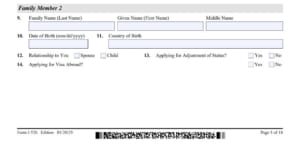 U.S. Citizenship and Immigration Services (“USCIS”) has announced that it is extending the deadline to reply to requests for evidence (“RFE”) and notices of intent to deny (“NOID”) in response to the Coronavirus (COVID-19) pandemic.
U.S. Citizenship and Immigration Services (“USCIS”) has announced that it is extending the deadline to reply to requests for evidence (“RFE”) and notices of intent to deny (“NOID”) in response to the Coronavirus (COVID-19) pandemic.
For applicants and petitioners who receive an RFE or NOID dated between March 1st and May 1, 2020, any responses submitted within 60 calendar days after the response deadline set forth in the RFE or NOID will be considered by USCIS before any action is taken.
The USCIS will provide further updates as the situation develops and will continue to follow the Centers for Disease Control and Prevention’s guidance. Please visit uscis.gov/coronavirus for the latest facts and other USCIS updates.
Enterline and Partners U.S. immigration lawyers can help applicants across Asia through one of our offices in Ho Chi Minh City, Manila and Taipei and are happy to assist you with any RFEs or NOIDs you might receive. Contact us at:
ENTERLINE & PARTNERS CONSULTING
Ho Chi Minh City, Vietnam Office
Ad: 3F, IBC building, 1A Cong Truong Me Linh Str., District 1, HCMC, Vietnam
Tel: +84 933 301 488
Email: info@enterlinepartners.com
Facebook: Enterline and Partners-Đầu Tư Định Cư tại Mỹ
Website: http://enterlinepartners.com
Manila, Philippines Office
Ad: Unit 2507 Cityland 10 Tower 1, 156 H.V. Dela Costa Street, Makati City, Philippines 1209
Tel: +632 5310 1491
Email: info@enterlinepartners.com
Facebook: Enterline and Partners Philippines
Website: https://enterlinepartners.com/language/en/welcome/




